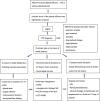Pancreaticopleural fistula in children with chronic pancreatitis: a case report and literature review
- PMID: 32493299
- PMCID: PMC7268358
- DOI: 10.1186/s12887-020-02174-x
Pancreaticopleural fistula in children with chronic pancreatitis: a case report and literature review
Abstract
Background: Pancreaticopleural fistula (PPF) is a very rare and critical complication of pancreatitis in children. The majority of publications relevant to PPF are case reports. No pooled analyses of PPF cases are available. Little is known about the pathogenesis and optimal therapeutic schedule. The purpose of this study was to identify the pathogenesis and optimal therapeutic schedule of PPF in children.
Case presentation: The patient was a 13-year-old girl who suffered from intermittent chest tightness and dyspnea for more than 3 months; she was found to have chronic pancreatitis complicated by PPF. The genetic screening revealed SPINK1 mutation. She was treated with endoscopic retrograde cholangiopancreatography (ERCP) and endoscopic retrograde pancreatic drainage (ERPD); her symptoms improved dramatically after the procedures.
Conclusions: PPF is a rare pancreatic complication in children and causes significant pulmonary symptoms that can be misdiagnosed frequently. PPF in children is mainly associated with chronic pancreatitis (CP); therefore, we highlight the importance of genetic testing. Endoscopic treatment is recommended when conservative treatment is ineffective.
Keywords: Case report; Child; Chronic pancreatitis; Pancreaticopleural fistula.
Conflict of interest statement
All authors declare that they have no competing interests.
Figures





References
-
- Lee YJ, Cheon CK, Kim K, Oh SH, Park JH, Yoo HW. The PRSS1c.623G>C (p.G208A) mutation is the most common PRSS1 mutation in Korean children with hereditary pancreatitis. Gut. 2015;64:359–360. - PubMed
Publication types
MeSH terms
Substances
Grants and funding
LinkOut - more resources
Full Text Sources
Medical
Miscellaneous

